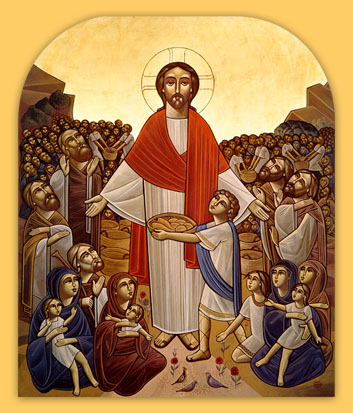Sneak Preview
Devra Torres | Apr 14, 2013 | 6 cmts
I’ve just spent a solid week in an Ann Arbor basement in the company of Pope Francis. Well, not in person, but I got a surprise opportunity to do one layer of editing of a collection of his homilies, letters, and addresses. (This explains why you haven’t heard from me in a while.) The book will be available from Scepter…well, I’ll let you know as soon as I have a date. But it was a worthwhile way to spend a week, and I thank my longsuffering children

for making it possible. (Actually the three pictured here, as you can imagine, were mostly useful in keeping the older ones productively occupied.)
As I got to know Pope Francis, I kept remembering that interview with Cardinal Dolan, before the conclave, when a reporter asked him how cardinals decide what the world needs in a pope, and he said—I think these were his exact words— “You look for someone who reminds you of Jesus.”

I think they found him.
Cardinal Bergoglio’s personality comes through in his writings, and one thing that’s crystal clear is his love for his people—and now we’re all his people. He’s been in the trenches with them for a long time, and he exhibits a hardy, real-life matter-of-fact-ness, without sentimentalism or pretty illusions. But there’s also a distinctly warmhearted protectiveness and determination to see everybody in the most pleasing light possible.

He decries the way a cold, impersonal "functionalsim" can seep into the Church's works of mercy.
He takes you back to Gospel stories—notably, the Prodigal Son, but many others, too—and throws new light on them. He notes how people always sought out Jesus’ company. Yes, they did it for miraculously multiplying bread and fish, and the healings, but he has the sense, he says, that, even if they didn’t know it themselves, that wasn’t the deepest reason. They were drawn to him, not just their own advantage. They lost track of time; they forgot to bring enough food; they were in danger of fainting on the way.

They didn’t know He was going to feed them miraculously—they just wanted to be with Him. He sees the same quality in people who come to the Church today—yes, to take advantage of the works of mercy, but also because what they really want, whether it's under their own radar screen or not, is to have that "delightful pretext" to spend time with Jesus. He sees in a tattooed teenager from the inner city a thwarted desire for permanence, not just a person who's broken the rules of polite society.

He talks of people in the outlying villages who don’t have priests anywhere near, and he sweetly but insistently nudges the priests in his charge to volunteer for duty in the boondocks. He talks about teenagers in the inner cities, looking for happiness in cocaine and promiscuity not because they’re evil, or hopeless cases—the idea of anyone being a hopeless case is clearly completely foreign to his mind and heart—but because they’re really looking for Jesus; they just don’t know it.
There is a definite pattern of emphasis on Christians, especially pastors, going out and meeting people where they are, not dismissing or despising them because they’re not where they should be. Look at the Father upon the return of the Prodigal Son, he says. He could have acted indifferent or furious with "this bum who goes through all the money, and now comes back because he got hungry"—and he could have given instructions for the butler to deal with him and clean him up while his father decided whether to grant him an audience or not. But no.

And I love this one—though it’s not from the book, but from an earlier one called Pope Francis: Conversations with Jorge Bergoglio, which is currently unavailable in English—at least, it was last week, but that could change. (There are, by the way, many, many people frantically translating Pope Francis right now, so if you hear that he’s said something that sounds unorthodox, or unlike him, do take it with a grain of salt. Fast translation is a highly dangerous occupation.)
There’s a persistent theme of not getting overly cozy inside our institutions, our buildings, our bureaucratic duties. We need to be like the shepherd who goes out to look for the lost sheep. We can’t be put off by “the smell of sheep” (which are not always so picturesque up close.)

Here’s how he puts it, according to this Catholic News Service article:
A church that limits itself to just carrying out administrative duties, caring for its tiny flock, is a church that in the long run will get sick. The pastor who isolates himself is not a true pastor of sheep, but a "hairdresser" for sheep who spends his time putting curlers on them instead of going to look for others.
In the Bible, the Good Shepherd leaves the 99 to go after the one who’s lost. But, he points out,
Today we have one in the pen and 99 we need to go looking for.
This is just a smattering of the good things I've been immersed in this week, but I hope it whets your appetite. Next week I'll be sharing his cautionary words about the ministrations of a "paternalistic and interventionist" state. For now, this sheep is still rejoicing at being under the care of this particular shepherd.

Comments (6)
Sapperdepitjes
Apr 14, 2013 4:56pm
On the tattoo image: this young Belgian woman named Kimberley Vlaeminck, said she had asked for just three little stars and then fell asleep at the tattoo shop when she was 18. She later admitted she agreed with each new star proposed, and hoped her alcoholic parents would actually like it. The stars have since then all been removed through a complex laser process. The woman, now 21, wrote a book about it and is known in Belgium as "sterrenmeisje", the stars girl...
On the prodigal son image: notice the hands of the father as painted by Rembrandt: one looks male, the other female...
Devra Torres
Apr 15, 2013 4:07pm
I'm happy to hear she was able to get them removed--I'll have to read the book. Someone said that you can tell that tatoos have become more banal and less shocking now that you can buy tatoo removal kits in your local WalMart (more or less the equivalent of Caprabo).
You're right, about the hands! I also started reading the Henri Nouwen book about that other painting of the return of the Prodigal Son. It looks like it will be a treat.
Katie van Schaijik
Apr 15, 2013 8:26pm
The emphasis on going out reminds me very much of John Paul II, who as a young university chaplain was known for his way of going out into the lives of his parishioners. Here is how Weigel describes his mode.
Here is how one of those students later described it:
Devra Torres
Apr 15, 2013 9:12pm
Yes! The publisher and I had a whole, long conversation about how best to translate "accompany," since it appeared so very often in different forms. It's an expression of how pastors ought to make the effort to "walk beside" the people in their care (which is very broadly defined), not just on a few, special religious occasions, but everywhere. And then, beyond that, it has to do with every Christian being willing to take on the exertions and discomforts and inconveniences and adventures involved in genuine love of neighbor.
Sam Roeble
Apr 17, 2013 9:18am
Companion: literally "bread fellow, messmate," from Latin com- "with" + panis "bread".
--with bread--very eucharistic!
Devra Torres
Apr 17, 2013 3:15pm
Very! There was also a part--I think a quote from Bl. JPII--about the expression "eating salt together," salt being a symbol of a bond that endures, is preserved.